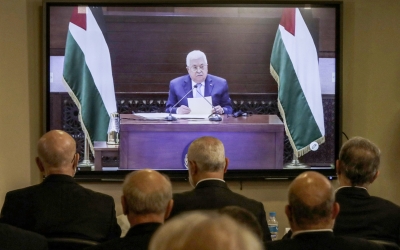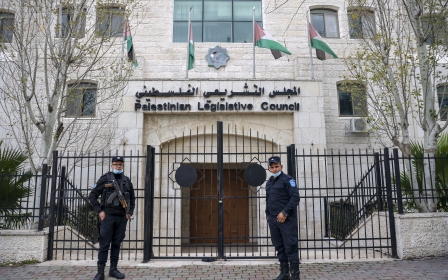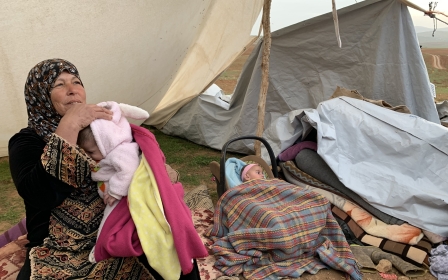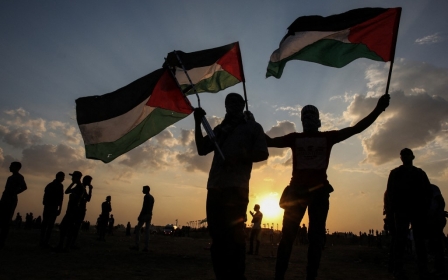Palestine: Lawyers rally against 'intrusion on judiciary' after controversial decrees
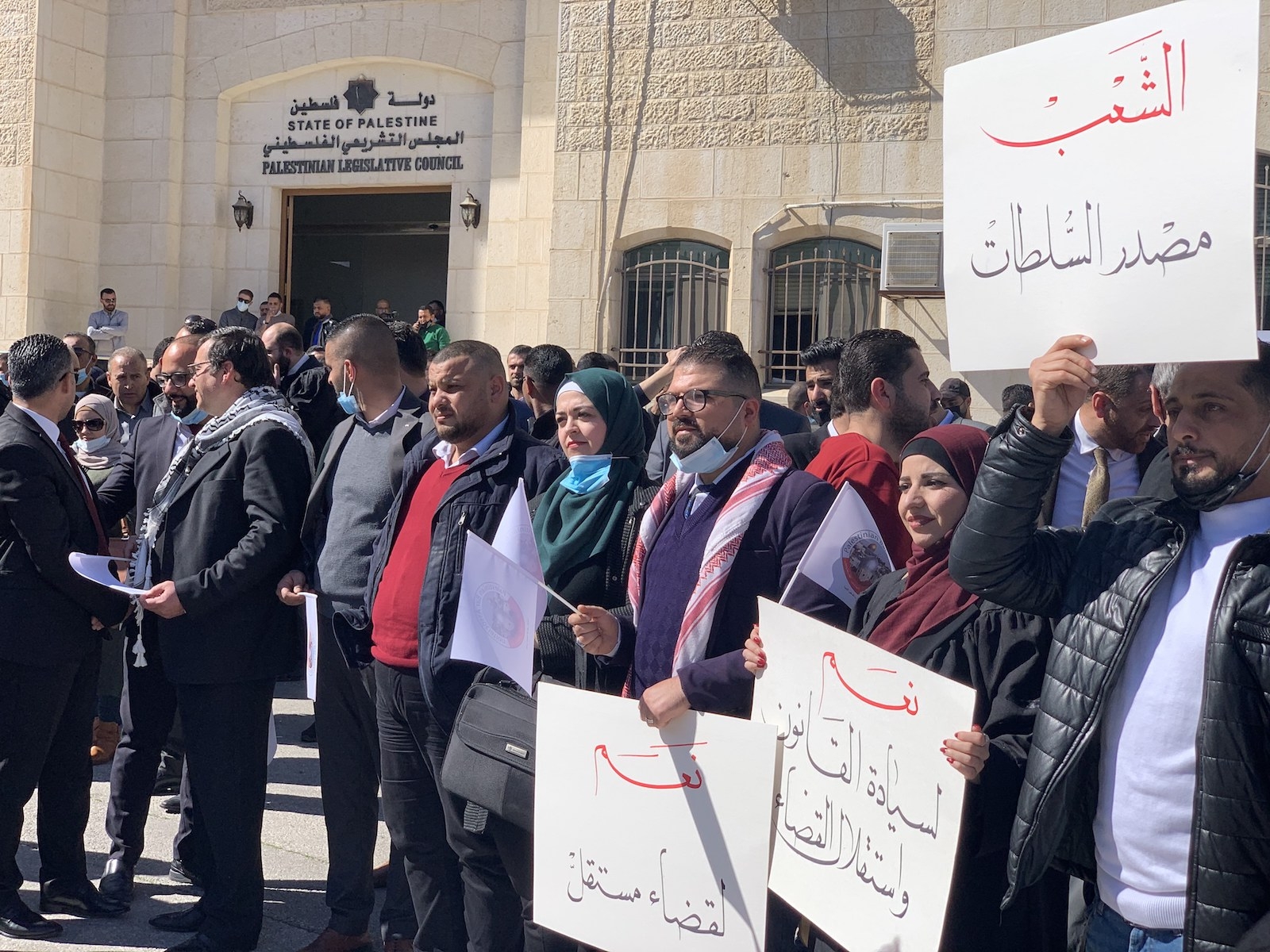
The West Bank is witnessing an unprecedented protest movement launched by the Palestinian Bar Association (PBA), in rejecting the recent Palestinian Authority decrees that further restrict judicial independence.
On 9 February, dozens of lawyers and former judges stood in the courtyard of the Ramallah-based Palestinian Legislative Council (PLC), chanting slogans calling for the protection of judicial independence. They also announced the beginning of an open-ended sit-in protest at the premises until their demands were met.
"This law cannot pass without the Bar Association rejecting and protesting against it, because it is a clear intrusion on the judiciary,” Jawad Obeidat, head of the PBA, told Middle East Eye.
The movement kicked off at the start of 2021 following President Mahmoud Abbas's issue of three presidential decrees on 30 December, amending judicial authority laws and processes in a manner which grants the executive branch that he heads, and those he appoints to high judicial positions, broad decision-making powers with far-reaching impact on judges, lawyers, and their jobs and futures.
The decrees came into effect on 11 January, when they were published in the official gazette, just four days before the announcement of elections for the long-defunct PLC, or parliament.
New MEE newsletter: Jerusalem Dispatch
Sign up to get the latest insights and analysis on Israel-Palestine, alongside Turkey Unpacked and other MEE newsletters
'This law cannot pass without the Bar Association rejecting and protesting against it, because it is a clear intrusion on the judiciary'
- Jawad Obeidat, head of the Palestinian Bar Association
While a new parliament is expected to take office in May, which will have the ability to nullify the laws passed, members of the PBA - which represents 15,000 lawyers - have been staging protests in front of Palestinian courts in various cities in the occupied West Bank.
Several rights groups have also issued statements denouncing the move as an attack on the separation of powers within the PA, and highlighting the obscurant nature of passing decrees at a time of elections, calling for their revocation.
'A real obstruction to the national dialogue'
The Ramallah-based Independent Commission for Human Rights (ICHR), a statutory monitor, and the National Coalition for Judicial Reform and Protection, expressed in a joint press release their concern that the “issuance of these decree laws at this particular time, with discussions around imminent general elections being held for the first time in 15 years, will constitute a real obstruction to the Palestinian national dialogue”.
The Gaza-based Palestinian Centre for Human Rights (PCHR) described the decrees as constituting “a serious violation of judicial independence at a very sensitive timing”, while the al-Haq rights group said they set a “dangerous precedent that destroys the foundations of a sound democratic approach based on the principle of separation of powers”.
The Euro-Mediterranean Human Rights Monitor called for the European Union to review its collaboration with the PA's judiciary, saying the executive authority decisions had "violated both separation between the three powers and neutrality principles".
Last week’s protest at the PLC coincided with the launch of meetings in Cairo between Palestinian political groups to discuss the upcoming general elections, due to be held in May. They hoped to convey a message to political parties about the gravity of recent legal decisions taken by President Abbas which have doubled the decision-making powers of the executive branch.
Throughout the period of the PLC’s suspension, Abbas has issued dozens of laws by decree, impacting various sectors, raising the suspicions of many jurists who viewed them as power-hungry moves by the executive in the absence of a parliament.
The PLC has been inactive since 2007, and in December 2018 President Abbas dissolved it entirely.
In the following year, the president also dissolved the High Judicial Council and replaced it with an interim Supreme Transitional Council with broad powers over the judiciary and public prosecution, including the ability to directly appoint and dismiss judges at all levels, to refer them to early retirement, or to re-assign them to state institutions.
'Unprecedented monopoly in decision-making'
As part of the 2019 decisions, Abbas promoted specific judges to the supreme council, referred dozens of other judges to early retirement, and lowered the retirement age to apply to all judges except those of the council. The decrees drew sharp criticism from civil society organisations, activists and judges at the time, who described them as the “widest interference in the judiciary in the history of the Palestinian Authority” and as an “unprecedented monopoly in decision-making by the executive authority”.
On 12 January, Abbas appointed Issa Abu Sharar, an octogenarian, as the head of the Supreme Transitional Council, a decision rejected by the Bar Association, which considers the council illegitimate because its judges were appointed instead of elected. Abbas also promoted a number of Court of First Instance judges to appeal judges, and transferred six to early retirement.
Bassam Zaid, judge at the Court of First Instance in Nablus, was transferred to work in a state institution without a clear position or duties. He believes that the latest decrees, introduced under the pretext of reform, had an ulterior motive.
“What happened was personal revenge against a group of judges who were rejecting what was taking place in the judiciary in terms of the deterioration and collapse of the system, and the control and intrusion by the executive authority," Zaid told MEE.
“All the judges who rejected the executive authority overstepping the judicial authority have been removed and transferred to work in state institutions, with the aim of laying the grounds for their complete removal."
He added that despite the approaching elections and the need for the Palestinian leadership to gain the voters' confidence, the PA's decisions had ignored all the demands raised by lawyers and judges.
‘Governed by temptation and tyranny’
Daoud Daraawi, Chairman of the Legal Committee of the Bar Association, believes the executive branch of the PA has been taking advantage of the suspension of the PLC all these years. He said the latest decisions confirmed its attempt to “pre-empt the electoral process, interfere with it, or nullify its impact.
'No one can speak in the people’s name without taking legitimacy from them through the ballot box'
- Daoud Daraawi, Chairman of the Legal Committee of the Bar Association
"The absence of the PLC has pushed us to live in a state of exception, governed by temptation, tyranny and oppression.
"The Legislative Council is the people's home, and the people alone are the source of authority. No one can speak in the people’s name without taking legitimacy from them through the ballot box."
He added that the movement is taking a stand to boycott not only the supreme judicial council but also other amended bodies, such as courts of appeal and administrative courts.
"It is inconceivable that we are in the 21st century, and there will be a law that allows a single judge to issue a sentence of up to 15 years' imprisonment without deliberation and without the presence of a body to guarantee the accused of the right to a fair trial,” said Daraawi.
While the executive branch has been encroaching on the judiciary for years and interfering with its process, the legalisation of these practices is a turning point.
“These decisions carry a very dangerous message for the entire democratic process. They did not come from a vacuum at this time," said Daraawi.
Middle East Eye delivers independent and unrivalled coverage and analysis of the Middle East, North Africa and beyond. To learn more about republishing this content and the associated fees, please fill out this form. More about MEE can be found here.


